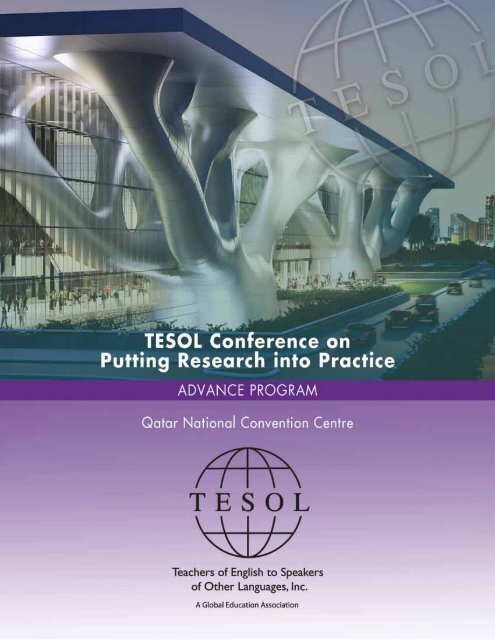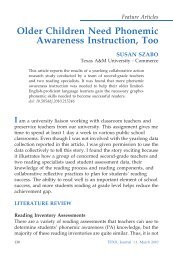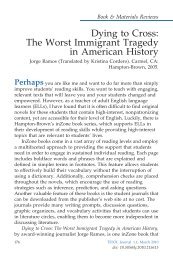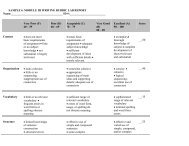Qatar National Convention Centre
Qatar National Convention Centre
Qatar National Convention Centre
You also want an ePaper? Increase the reach of your titles
YUMPU automatically turns print PDFs into web optimized ePapers that Google loves.
<strong>Qatar</strong> <strong>National</strong> <strong>Convention</strong> <strong>Centre</strong>Saturday, 1 October08:00–16:00 Registration Open09:00–12:00 Preconference WorkshopsTeaching Multiple Aspects of Writing: Modeling and AssessingWorkshop Leader: Alister CummingThis workshop proposes that writing instruction in second or foreign languages fundamentally involvestwo functions—modeling and assessing—about multiple aspects of writing. Participants distinguish andanalyze some of the multiple aspects of writing (e.g., text genres, processes of composing, expression ofpersonal identity, and sociocultural actions), then they examine and develop particular approaches formodeling these various aspects pedagogically (e.g., through text analysis, scaffolding, peer collaboration,and community building) and for assessing them (e.g., for purposes of establishing proficiency, toinform teaching and learning, for improving successive written drafts, and for documenting long-termachievements) for diverse student populations (i.e., children, adolescents, and adults in various culturalcontexts). The workshop reviews relevant research studies and address fundamental theoretical issues butfocuses on participants developing and analyzing their teaching and assessment practices.Alister Cumming is professor and head of the <strong>Centre</strong> for Research on Languages and Literacies (CERLL,formerly the Modern Language <strong>Centre</strong>) at the Ontario Institute for Studies in Education, University ofToronto. His research and teaching focus on writing in second languages, literacy and assessment inclassroom and formal testing contexts, and curriculum evaluation, particularly of programs for English asa second or foreign language. Alister has published extensively on these topicsand has conducted variousresearch and evaluation projects in Canada and internationally. He currently serves as executive directorfor the journal Language Learning and as chair of the TOEFL Committee of Examiners at Educational TestingService. His most recent books are Goals for Academic Writing and A Synthesis of Research on SecondLanguage Writing in English (with Ilona Leki and Tony Silva).Teaching and Learning VocabularyWorkshop Leader: Norbert SchmittSecond language learners need to acquire a large vocabulary in order to use English well. This workshopfocuses on the types of vocabulary knowledge learners need to possess and how teachers can bestfacilitate that knowledge. Topics include• the size of vocabulary which is needed to function in English• the types of word knowledge necessary to understand and produce English• the ways in which vocabulary learning is incremental• consolidation and how this might be achieved• enhancement of partial knowledge• phrasal vocabulary and what implications this vocabulary has for pedagogy• the role of memory in vocabulary learning (and forgetting) processesParticipants leave the workshop with an enhanced understanding of• the nature of English vocabulary• reasonable vocabulary learning targets for their students• how vocabulary is acquired• a range of vocabulary teaching techniques2
<strong>Qatar</strong> <strong>National</strong> <strong>Convention</strong> <strong>Centre</strong>Annamaria Pinter is associate professor of ELT/applied linguistics at the University of Warwick. Herresearch interests include all aspects of child second language acquisition and pedagogy, task-basedlearning, and language teacher education and development. She has published widely and given talks atinternational conferences on these topics. Her recent publications include the internationally well-knownhandbook for primary school language teachers Teaching Young Language Learners, and Children LearningSecond Languages.Teaching and Learning L2 ReadingWorkshop Leader: Bill GrabeL2 reading is a complex language skill that all academically oriented students need to master. Teachersare sometimes unsure of how to draw together the various ideas and instructional resources into a morepersonal coherent framework for teaching reading. The purpose of this workshop is to introduce a largenumber of practical suggestions for teaching reading that are both effective for learning and supported byresearch. These suggestions cover a range of reading skills and knowledge bases that are very importantfor reading comprehension abilities, including vocabulary learning, main-idea comprehension, readingstrategies, fluency, discourse awareness, and motivation. The suggestions are drawn from a largercurricular framework that represents a useful translation of research implications to teaching applications.Participants are asked to do several tasks to understand better how these ideas work as part of readinginstruction and to experience how these tasks support students’ reading skills development.Participants• understand the major component skills and knowledge bases that contribute to reading comprehension.• practice and discuss at least 10 instructional activitiesWilliam Grabe is Regents Professor of Applied Linguistics in the English Department at Northern ArizonaUniversity, where he teaches in the master of arts in TESOL and doctorate in applied linguistics programs.He is interested in reading, writing, literacy, written discourse analysis, and content-based L2 instruction. Hismost recent book is Teaching and Researching Reading (with F. Stoller, 2nd edition in 2011). He has alsoauthored Reading in a Second Language: Moving From Theory to Practice, co-authored Theory and Practiceof Writing (with R..B. Kaplan), and co-edited Directions in Applied Linguistics. He has also served as editorof the Annual Review of Applied Linguistics (1990–2000) and he is a past President of the AmericanAssociation for Applied Linguistics (AAAL, 2001–2002). He received the 2005 Distinguished Scholarshipand Service Award from AAAL.A Sociocultural Approach to Teaching Languages and Literacies for AdolescentsWorkshop Leader: Maggie HawkinsA sociocultural approach to language teaching and learning situates language and literacy use in theirsocial and cultural contexts. Language, always used by and between people for the purpose of meaningmaking,is not a stable set of vocabulary and structures, but rather includes diverse repertoires of forms andfeatures that can be put together with other things in multiple ways to make specific meanings. Literacies,likewise, are more than encoding and decoding print but include all the ways in which people engage withtexts (both print and nonprint). A sociocultural approach recognizes and identifies repertoires of languagesand literacies in and out of school and leverages them for classroom learning and teaching. It also, througha view of learning as scaffolded participation in joint tasks and activities, helps us envision the appropriatedesign of classrooms, curriculum, and pedagogy. In this workshop participants explore4
<strong>Qatar</strong> <strong>National</strong> <strong>Convention</strong> <strong>Centre</strong>• situated languages and literacies• culturally and linguistically responsive teaching• designs of classrooms as learning spaces• participation patterns used in instruction• building on students’ knowledge and experiences• connections between home and schoolMargaret Hawkins is a professor in the Department of Curriculum and Instruction at the University ofWisconsin–Madison. Her primary research interest, dedicated to promoting equity for all learners, is inlanguages and literacies in and out of school, including classroom, home, and community-based settings.Her published work examines classroom ecologies, families and schools, and language teacher education.Current projects focus on global digital partnerships for youth, education in Uganda, and nongatewaydistricts’ responses to new immigrant and refugee populations. She has published widely and serves as theChair of the TESOL Research Standing Committee as well as on multiple organizational and editorial boards.13:30–15:15 Opening Ceremony and Plenary Session Panel DiscussionWhat Are the Issues in Putting Research Into Practice in Your Area of Research?Featured Speakers: Alister Cumming, University of Toronto; Norbert Schmitt, University of Nottingham;and Annamaria Pinter, University of Warwick15:30–16:15 Concurrent SessionsDeveloping Self-Regulated Distance Language Learners: A Model for Course DesignPresenter: Maureen Andrade, Utah Valley UniversitySuccess in distance language learning requires self-regulation, or the ability to control the factors that affectlearning. The presenter introduces a model of self-regulated distance learning, and reports on a study thatexamined the degree to which the features of the model helped learners increase their self-regulation andlanguage proficiency.The Effectiveness of a Task-Based Learning Strategy on Developing Primary Students’Reading Comprehension and Writing Skills in Light of the Multiple Intelligences TheoryPresenter: Manal Kabesh, <strong>National</strong> Center For Educational Research and DevelopmentReading and writing are two skills that mirror each other, and they ought to be taught in such a way as tocomplement each other. Literature is a powerful vehicle for integrating reading and writing through usingvarious tasks involving the different learning styles. Multiple intelligences theory and task-based learningshows that students learn best about a domain when they experience that domain through the mirror ofdifferent intelligences. Hence, all students are smart if only they are taught more effectively in ways thatinvolve different intelligences.Attending to the Task: What Teachers Focus on When They Critique Tasks for Classroom UsePresenter: Virginia Samuda, Lancaster UniversityThis session reports how 18 practitioners with varying amounts of professional experience critiqued 12commonly used classroom tasks. Findings show differences in what participants singled out for criticalcomment, and in how they articulated and elaborated their comments. Implications for pedagogicallygrounded task research and for teacher education are discussed.5
<strong>Qatar</strong> <strong>National</strong> <strong>Convention</strong> <strong>Centre</strong>Teachers’ Uses of the Target (L2) and First Language (L1) in Foreign LanguageClassrooms: Effective Use of L1 to Teach L2Presenter: Zohreh Eslami, Texas A&M UniversityBased on research findings, the premise that students’ L1 should not be used when teaching L2 ischallenged. Effective use of L1 for teaching L2 by a highly competent <strong>Qatar</strong>i nonnative-English-speakingteacher is presented to show the facilitative effects of using L1 for teaching L2.Cooperative Development or the Art of Teacher MaintenancePresenter: Magdalena Rostron, <strong>Qatar</strong> FoundationThe session considers the idea of teaching as learning, through teacher training, education, anddevelopment. It focuses on cooperative development as one of the most accessible, effective, andsustainable forms of professional support and improvement.Let Me Tell You a Story: The Folktales and Fables FactorPresenter: Maggie Mieske, <strong>Qatar</strong> University Foundation ProgramSince storytelling is such a strong oral tradition in Arab culture, can reading stories aloud to school childrenmotivate Arab university students to read and achieve more academically? This presentation reports onaction research that incorporates reading aloud and service learning, the methods and materials used, andthe remarkable results.16:30–18:00 Networking ReceptionSunday, 2 October08:30–09:00 Networking and Exhibits09:00–10:00 Plenary SessionThe Good Language Learner: What We Have Learned From Research About Attitude andMotivationFeatured Speaker: Kassim Ali Shaaban,Second language acquisition research has shown that language learners vary considerably in the rateof success in acquiring a new language, in the frequency and type of learning strategies they use, andin their motivation for acquiring a new language. This presentation begins with a brief overview of theresearch and factors that contribute to successful language learning experiences. It then focuses on the roleof attitude and motivation in learning English as a second language and highlights research conductedon Middle Eastern students. The presentation emphasizes two main points: First, different students havedifferent motives for learning English: Their perceptions and beliefs about language learning differ; theirexpectations and efforts vary; and their engagement in their learning is not uniform. Second, learners’attitudes toward the second language are not constant; they may change depending on sociocultural andcontextual educational changes.6
<strong>Qatar</strong> <strong>National</strong> <strong>Convention</strong> <strong>Centre</strong>Kassim A. Shaaban is professor of applied linguistics in the English Department at the AmericanUniversity of Beirut. His ESL experience includes teaching, research, teacher training, program design,curriculum development, and assessment. His research interests cover a wide range of topics: languagepolicies in education; attitudes and motivation; assessment; and cooperative learning in ESL. He haspublished numerous articles in international journals and given conference presentations worldwide on thesetopics. His current focus in research is on the policies of foreign language education in the Arab world.10:00–10:30 Morning Tea, Networking, and Exhibits10:30–11:15 Concurrent SessionsTeaching Science Through English: Where Is the Synergy?Presenter: Christopher Morrow, United Arab Emirates UniversityTeaching elementary science using English as the medium of instruction is a popular practice that canlead to weak science and weak English. The presenter analyzed videotapes of 18 science lessons andfound that teachers missed many opportunities to develop English more deliberately and deepen students’understanding of scientific processes.The Online Class as Arena of Activity: Sociocultural Principles and Course DesignPresenter: Deryn Verity, Osaka Jogakuin CollegeOnline instruction can seem to contradict everything responsive teaching stands for. One online MATESOLsecond language acquisition class, explicitly designed along sociocultural lines, provides evidence tothe contrary. The study found similar levels of professional satisfaction, collaborative interaction betweenstudents and instructors, and reflective insight as compared to those experienced in traditional contexts.Assessing English Language Placement Tests for Use in <strong>Qatar</strong>i Postsecondary InstitutionsPresenters: Virginia Christopher, University of Calgary–<strong>Qatar</strong>; Karen Brooke, University of Calgary-<strong>Qatar</strong>; Brad Johnson, University of Calgary-<strong>Qatar</strong>Using English language placement tests that are appropriate for both Institutional and cultural contexts isessential to effective teaching and learning. This session presents a study designed to develop a rubricappropriate for the Arabian Gulf cultural context to assist the area’s postsecondary institutions in selectingsuitable placement tests.Highways Through the Motivational Desert: What Drives the Saudi Learner?Presenters: Yusuf Torofdar, Dar Al Uloom University; Dennis Love, Dar Al Uloom UniversitySaudi learners have a distinct religious, cultural, and socioeconomic background. Contemporary theoristsargue that success in language acquisition greatly depends on the learner’s orientation toward the targetculture. This session presents a comprehensive study of Saudi students who are studying English in a highereducational institute, and it explores the motivational profiles of the different learner types.Tracking College Writing Development: Complexities, Strategies, and Accomplishments ofGood Language LearnersPresenter: Silvia Pessoa, Carnegie Mellon University in <strong>Qatar</strong>Based on a 4-year longitudinal study of college literacy development, this presentation reports on thewriting development of multilingual students identified as good language learners. The presentationhighlights the linguistic elements that reveal how student writing has developed during a 2-year period andthe strategies students used.7
<strong>Qatar</strong> <strong>National</strong> <strong>Convention</strong> <strong>Centre</strong>10:30–12:00 Submitting Your Research to an Academic Journal: What Are Editors Looking For?Presenters: Alan Weber, Weill Cornell Medical College in <strong>Qatar</strong>; David Palfreyman, Zayed University;Christopher Leonard, Editorial Director, Bloomsbury Foundation JournalsTwo regional journal editors and the director of Bloomsbury <strong>Qatar</strong> Foundation Journals each give 10-minutepresentations on how and what to submit to academic journals accepting TESOL-related research. Thepanelists also discuss framing research questions in the Gulf, preparing manuscripts, and approachingeditors. The session concludes with a question period.11:15–11:35 Concurrent SessionsSTEL: Professional Development for Teachers of English Language LearnersPresenter: Louise Wilkinson, Syracuse UniversityHow prepared are prospective teachers to understand and meet the needs and challenges of Englishlearning students? The presenter shares insights from participation in an innovative multiyear nationalfaculty development program. The goal of STEL is to improve the effectiveness of K–12 teacher educationprograms, preparing prospective teachers for linguistically diverse classrooms.Preparing Students for Core Reading and Writing Competencies: An Analysis of ESLTextbooksPresenter: Margi Wald, University of California, BerkeleyThis session highlights core reading and writing competencies expected of students entering U.S. highereducation programs as well as selected lexical and grammatical features of professional academictexts. It then presents an analysis of advanced-level ESL textbooks, comparing task types and foci to thecompetences and features noted in current research.11:15–12:00 Concurrent SessionsNot All Error Types Are Equal: Treating the Untreatable in Second Language WritingPresenter: Diane Schmitt, Nottingham Trent UniversityThis session applies insights from research on error correction in second language writing to instructionalpractice. Previous findings have categorized vocabulary-related errors as untreatable. However, this sessionoffers tools that enable writing teachers to provide feedback that both treats immediate vocabulary errorsand offers scope for long-term lexical development.Home Literacy and Agency: An Ethnographic Approach to Studying the Home LiteracyPractices of Six Multilingual Children in <strong>Qatar</strong>Presenter: Misti Savage-Shepherd, <strong>Qatar</strong> AcademyResearching home literacy practices of multilingual students may lead teachers to see new insights into the rangeof literacy abilities their students have instead of viewing them from an English-only perspective. This sessionreviews the results found from six different ethnographic case studies and the patterns found across them.Learning L2 Words With Pictures: The Role of Individual Differences in Processing WordMeanings and FormsPresenter: Derek Theriault, College of the North Atlantic–<strong>Qatar</strong>The presenter examines how individual differences in memory and attention influenced the effectiveness ofusing pictures to teach L2 vocabulary to beginners. Using pictures appears to be an efficient way to commitwords to memory, and differences in memory and attention are associated with learners’ success in this task.8
<strong>Qatar</strong> <strong>National</strong> <strong>Convention</strong> <strong>Centre</strong>11:40–12:00 Concurrent SessionsThe Focus of Online Peer Feedback and Its Impact on Saudi Female EFL Students’ WritingPresenter: Reem Aloud, Imam Muhammad Ibn Saud Islamic UniversityThis session reports on a study that explored the focus of online peer feedback and its impact on writing.The findings reveal that the participants’ feedback focused on form rather than content and organizationand that most of the incorporated feedback focuses on form. The participants eventually obtained thehighest scores on form.Implementation of Vocabulary Learning Strategies from a Dynamic Systems TheoryLearning perspectivePresenter: Carlos Andres Rico Castillo, Universidad de los AndesFor decades, language researchers have investigated how second language (L2) vocabulary can be effectivelylearned; findings have supported the use of vocabulary learning strategies. This quantitative experiment showsthat training students to use vocabulary learning strategies can significantly broaden L2 vocabulary.12:00–13:30 Networking Lunch and Exhibits13:30–14 :15 Concurrent and Poster SessionsPoster Session• Iranian EFL Students’ Writing Strategies for Error CorrectionPresenter: Akbar Azizifar, Islamic Azad University• Teaching ESL Learners More Effective Academic Writing Skills and KnowledgePresenter: Cameron Richards, University of Technology Malaysia• Kick Starting Autonomy for Writing Proficiency OnlinePresenter: Carmen Denekamp, <strong>Qatar</strong> University, <strong>Qatar</strong> & Massey University• ‘Globish’ What?Presenter: Hugh Hughes, Texas A&M University at <strong>Qatar</strong>• The Notions of Acceptability, Grammaticality, and Correctness in EFLPresenter: Mohamed Basil Al-Azzawi, University of Mosul• Researching Written Corrective FeedbackPresenter: Sabina Ostrowska, Khalifa UniversityConcurrent SessionsArab Medical Students Develop Their Autonomy and Agency in Learning EnglishPresenter: Diane Malcolm, Arabian Gulf UniversityIn the context of reinterpreting the good language learner, this interview-based study of Gulf medicalstudents describes how initial failure attributed to poor English proficiency motivated them to developgreater autonomy in their language learning in the process of establishing their future identity as globalizedmedical professionals.Developing Effective Questionnaires for ELT ResearchPresenter: Christine Coombe, Dubai Men’s CollegePeople have responded to so many questionnaires and surveys over the course of their lives that when it comestime to develop one of their own for research purposes, they underestimate the knowledge and skills involved.In this presentation, participants learn how to develop effective questionnaires and surveys for ELT research.9
<strong>Qatar</strong> <strong>National</strong> <strong>Convention</strong> <strong>Centre</strong>Teacher Efficacy, Teacher Autonomy, and Perfectionism: Possible Relationshipsand DifferencesPresenters: Ramin Akbari, Tarbiat Modares University; Kobra Tavassoli, Tarbiat Modares University andKaraj Islamic Azad UniversityThe literature on teacher education indicates that teacher efficacy, autonomy, and perfectionism are amongthe variables that affect teachers’ classroom performance. The purpose of this study is to discover possiblerelationships among these variables and to document probable differences among them with respect toEnglish teachers’ gender, degree, and experience.The Power of Literature within EFL ContextsPresenter: Suhair Al Alami, Al Ghurair UniversityThis session offers thought-provoking suggestions on how literary texts can be utilized to promote students’communicative competence and enhance their critical thinking skills. The session is based on empirical researchundertaken in the United Arab Emirates. The presenter makes recommendations in light of the study’s findings.Online Peer Collaboration: Teachers Supporting Each Other’s Instructional Use of CBM DataPresenter: Rebecca Pierce, <strong>Qatar</strong> AcademyThis session shares findings that explain how teachers provide support in a virtual environment. Online dyadicconversations, which focused on students’ instructional needs, were analyzed for types of support. The studysuggests that teachers offer both constructive support and solidarity, and that a lack of response reduces support.14:15–14:35 Concurrent SessionsPerceptions of the Good Language Teacher by University Students in <strong>Qatar</strong>Presenter: Robert Rogers, <strong>Qatar</strong> UniversityWhat are the qualities of an effective language teacher? Do the beliefs of university students in <strong>Qatar</strong>correspond to these qualities? This session examines the findings of a qualitative–quantitative study into theperceptions of the good language teacher by students enrolled in first-year writing courses at <strong>Qatar</strong> University.Addressing Academic Access in Higher EducationPresenter: Arlys van Wyk, University of the Free StateThe failure of South African language in education policy to provide English language learners with theopportunity to gain cognitive academic language proficiency has posed a challenge for tertiary institutions.This session describes the problem and the response of one institution to these learners’ needs.14:15–15:00 Concurrent SessionsPerformance Assessment: Oral Presentations Versus Poster SessionsPresenters: Amira Salama, Al-Azhar University; Yasmine Abdallah, Al-Azhar UniversityYou can inspire optimum performance in speaking projects in your class: by turning speaking projects andcritical thinking activities into learning celebrations where students enjoy learning while being assessed.This session presents the poster session approach applied in EFL classes. Let’s authentically assess ourstudents and celebrate learning.10
<strong>Qatar</strong> <strong>National</strong> <strong>Convention</strong> <strong>Centre</strong>Life Coaching as Professional Development Influences CompetenciesPresenter: Jane Hoelker, <strong>Qatar</strong> University English FoundationLife coaching is increasingly employed as an approach to professional development in educationalleadership programs in the United States and <strong>Qatar</strong>. This trend has arisen in response to the unfulfilledpromise of training seminars to sustain changes. This strengths-based approach to performanceimprovement evolved out of adult learning theory and growth-fostering psychologies.Professional Development of Trainers through Reflective ePortfoliosPresenter: Salima AL-Sinani, Ministry of Education, Sultanate of OmanThis session explores how reflective ePortfolios have enhanced the professional development of Omanitrainers. Trainers’ perceptions of the reflective ePortfolio’s role and usefulness in supporting their continuingprofessional development is explored. Examples of ePortfolios are analysed and practical issues related totheir effective implementation are discussed.14:40–15:00 Concurrent SessionsReading Habits and College Readiness of Students in <strong>Qatar</strong>Presenters: Rachid Bendriss, Weill Cornell Medical College in <strong>Qatar</strong>; Krystyna Golkowska, Weill CornellMedical College in <strong>Qatar</strong>Students graduating from <strong>Qatar</strong>i high schools enter American institutions of higher education with weakcollege success skills. This weakness is particularly visible in the area of reading comprehension and criticalthinking. It seems that any attempt to solve this problem needs to focus on both first- and second-languageliteracy skills. The presenters share the results of their study on <strong>Qatar</strong>i students’ reading habits and theirability to use effective reading strategies. Information for the study was gathered from literature review,questionnaires and semi-structured interviews; the subjects included students in Education City and otherinstitutions of higher education in Doha. Based on the results of their study, the presenters propose a numberof practical solutions for use in English language classrooms.Moving from Deficits to Strengths: Using an Appreciative Inquiry Approach to EnhanceEnglish as a Second or Other Language (ESOL) Teaching and LearningPresenter: Paul MacLeod, College of the North Atlantic <strong>Qatar</strong>Student engagement is a crucial factor in learning, particularly in the English language classrooms. Thepresenter explores a case study illustrating how appreciative inquiry, a strengths-based approach, can beused to build a cohesive classroom culture to facilitate language learner engagement and success.15:00–15:30 Afternoon Tea, Networking, and Exhibits15:30–15:50 Concurrent SessionsA Place for Needs Analysis in ESP/EAP Instruction in the Arab WorldPresenter: Holi Ibrahim Holi, Higher College of TechnologyThis presentation underscores the importance of needs analysis and learner involvement in producingmaterials for English for specific or academic purposes in an engineering context, notably in the Arabworld. Participants discuss the research questions, methodology, research significance, objectives, andchallenges in ESP instruction.11
<strong>Qatar</strong> <strong>National</strong> <strong>Convention</strong> <strong>Centre</strong>Peer and Near Peer Models for English Language LearnersPresenter: Katherine Song, Hiroshima UniversityThe presenter explores the potential benefits of introducing nonnative varieties of English, in particularpeer and near-peer language models, to adult learners. The learners’ guided exposure to such varieties isthought to raise their appreciation for their own and other learners’ Englishes and aid in their languagedevelopment.15:30–16:15 Concurrent and Poster SessionsPoster Session• Learner Autonomy in SCT FrameworkPresenter: Andisheh Saniei, Islamic Azad University• Implications of MI Theory in EFL ClassroomsPresenter: Azzeddine Bencherab, Mascara University• Issues in Mixed Methods Research in Applied LinguisticsPresenter: Mohammad Mehdi Etedali, University of Jyvaskyla• The Role of Brain-Based Gender Differences on the Vocabulary Learning StrategiesPresenter: Sema Uster, Middle East Technical University• Reflecting about Moral Dilemmas in English Language TeachingPresenter: Leila Tajik, Tarbiat Modarres University• Barriers of Internet Use by Women and How These Barriers Serve to Hinder SecondLanguage Learning and AcquisitionPresenter: Lucas Kohnke, American University of AfghanistanConcurrent SessionsLearning in the “Gap”: Evidence from a First-Semester Writing CoursePresenter: Dudley Reynolds, Carnegie Mellon University <strong>Qatar</strong>This study examines cross-sectional and longitudinal variation in what students say they are learning froma first-semester university writing course at an American university in the Middle East. Students completedsurveys at the end of 20 instructional units addressing argument formation, text structure, academic writingconventions, and language conventions.Prioritizing Practitioner Research Through Exploratory PracticePresenter: Cindy Gunn, The American University of SharjahExploratory practice is a principled practitioner research perspective that busy teachers can adopt inordinary teaching situations to enhance the teaching and learning process. The presenter discussesexploratory practice and outlines a recent practitioner research project conducted with MATESOL studentsstudying in the United Arab Emirates.Arabic, English, or 3arabizi? Projecting Identity through Online Language ChoicePresenter: Robert Bianchi, Virginia Commonwealth University <strong>Qatar</strong>This session explores how bilingual discussion forum posters strategically select between English, Arabic,and Latin-scripted Arabic (3arabizi) in order to project different identities that reflect and bolster theirdifferent ideological positions in an online debate regarding religious freedom and moral authority in SaudiArabia.12
<strong>Qatar</strong> <strong>National</strong> <strong>Convention</strong> <strong>Centre</strong>15:55–16:15 Concurrent SessionsStudy Buddy: Autonomy Through CollaborationPresenter: Manal Bassyony, King Abdul Aziz UniversityThe presenter reports on an instructional technique used to enhance the quality and quantity of classroominput, student motivation, and peer interaction. The technique adopted emphasizes feedback as anecessary tool for individualizing language learning, promoting learner autonomy, and addressingdifferentiation. Study Buddy is a selection of sequenced techniques separately validated by previouslanguage research.16:15–17:45 Plenary SessionBridging the Gap Between Tasks and Learning: Patterns in the Language People Use onCommunication Tasks and Why It Might MatterFeatured Speaker: Martin BygateThe perceived gap between communication tasks and language learning arises partly from our lack ofknowledge about the language that learners use on tasks. This session considers how we might chart andinterpret learners’ task-based language. Most current analyses of task-based language use global measures,but this approach omits much of learners’ on-task use of language, and so ignores potentially importantaspects of their work and of their learning. I turn instead to dynamic systems theory and suggest thatstudents’ task-based language can be thought of as a trajectory. This approach helps identify potentiallyinteresting on-task processes, reveals the relationship between task and language, and shows how differentstudents might handle tasks and now teachers and students might use communication tasks.Martin Bygate is professor of applied linguistics and language education at University of Lancaster. Hisresearch interests include task-based language learning, second language speaking, and pedagogicalgrammar. He is especially interested in the connections between tasks, language, the teacher, and learning.Publications include Speaking, Grammar and the Language Classroom (co-edited with Alan Tonkyn andEddie Williams), Researching Pedagogic Tasks (co-edited with Peter Skehan and Merrill Swain), and Tasksin Second Language Learning (co-authored with Virginia Samuda). He also co-edited the journal AppliedLinguistics from 1998–2004 and serves as the current president of the International Association of AppliedLinguistics.To be announcedEvening Cultural ProgramMonday, 3 October08:30–09:00 Networking and Exhibits09:00–10:00 Plenary SessionProfessional Development Matters: Bridging Research and PracticeFeatured Speaker: Deena BoraieOver the years, a steady stream of research and commentary has shown that professional development ofteachers does matter. Teachers have a direct impact on students and thus, teachers are the backbone ofany country’s human capital development strategy. A change in thinking about professional developmentis necessary to foster a culture of constantly upgrading skills, knowledge, and competencies. A highlydeveloped strategy for the professional development of teachers means that a lifelong learning frameworkis in place and that the society as a whole values the importance of continuous learning. This presentation13
<strong>Qatar</strong> <strong>National</strong> <strong>Convention</strong> <strong>Centre</strong>reflects on the current gap between research and practice in professional development of teachers andanalyzes some of the factors that have led to this gap. The presenter proposes ways forward to bridge thegap between research and practice.Deena Boraie is the associate dean for instructional affairs at the School of Continuing Education (SCE)at the American University in Cairo. She leads the development and supervision of SCE’s instructionalactivities and continuing education and training programs in the areas of English language, informationtechnology studies, business and management studies, Arabic language, translation, and teacher training.She is also a language testing expert and an assessment and evaluation consultant and trainer. She is avisiting assistant professor in the master of arts in applied linguistics program at the Faculty of Arts, EnglishDepartment of Cairo University, where she teaches research.10:00–10:30 Morning Tea, Networking, and Exhibits10:30–11:15 Concurrent and Poster SessionsPoster Session• The Hidden Side of the Work: Uncovering English Language Teachers’ Moral KnowledgeBasePresenter: Leila Tajik, Tarbiat Modarres University• The Efficiency of a Training Program for Improving Students’ Skills in English as A SecondLanguage With 11th Grade StudentsPresenter: Mohamed Salaheldein Abdelaziz Ahmed, Hamad Bin Abdalla Bin Jassim Independent Schoolfor Boys• Learning Style Differences of EFL Middle Eastern Students and Western Faculty in <strong>Qatar</strong>Presenter: Tracey Lemke-Westcott, University of Calgary <strong>Qatar</strong>• The Delight of Challenging Students through Project WorkPresenter: Azzeddine Bencherab, University of Mascara• Teaching Pronunciation in Canada and the Middle EastPresenter: Amy Holtby, College of the North Atlantic - <strong>Qatar</strong>• Lower Level Gulf Learners’ Preference for Cultural Content in TextsPresenter: Meredith Bishop, College of the North Atlantic - <strong>Qatar</strong>Concurrent SessionsThe Research Publication ProcessPresenter: Alan Weber, Weill Cornell Medical College in <strong>Qatar</strong>An international journal editor offers insight into the process of research publication, including manuscriptpreparation, submission, and review; how editors and reviewers make decisions; and how to respond toreviewer reports. Also covered are research agendas, funding opportunities, publication outlets, and careerstrategies.Bridging the Gap Between General Academic Writing and Discipline-Specific WritingPresenter: Fredricka Stoller, Northern Arizona UniversityThis session reports the results of an interdisciplinary (applied linguistics and chemistry) project supportedby the <strong>National</strong> Science Foundation. Emphasis is placed on a read-analyze-write approach to disciplinespecificwriting instruction at the tertiary level. A discussion of each stage of the process is discussed.Implications for other disciplines are explored.14
<strong>Qatar</strong> <strong>National</strong> <strong>Convention</strong> <strong>Centre</strong>The Effect of Focused and Unfocused Direct Corrective Feedback on New Pieces of WritingPresenter: David Frear, <strong>Qatar</strong> UniversityThis session presents a study that investigated the efficacy of focused and unfocused direct correctivefeedback (CF) on the accuracy of new pieces of writing. The research found that a focused direct CF groupoutperformed both an unfocused direct CF group and a control group (no CF) in the long term.Impact of Locus of Control on Students’ Learning StylesPresenter: Edith Flahive, Abu Dhabi Men’s CollegeThe presenter investigates the learning styles of male Emirati students within the context of locus of control.The internality/externality of a group of students is established and precursors attributable to this orientationare identified. Implications for learning and teaching are examined and discussed.10:30–12:00 Concurrent SessionTransnational Attorneys Learning Advanced U.S. Legal Discourse and WritingPresenters: Michelle Ueland, Georgetown Law School; Michelle Ueland, Georgetown Law; AlexisPaddock, Georgetown LawThis session combines the field of law with advanced writing in English for professional purposes. Presentersdescribe their use of research, including metatext and discourse analysis (Hoffman), classroom-basedresearch (Paddock), and qualitative case study research (Ueland), to inform instructional design anddelivery of a legal writing program for transnational attorneys.11:15–11:35 Concurrent SessionsConnecting Content and Language: Cross-Disciplinary Faculty Learning Communities inHigher Education EAPPresenters: Andrew Meyerhoff, Saga University; Kenzi Watanabe, Saga UniversityFaculties within universities form distinct and, ideally, interdependent cultures. Unfortunately, they oftenbecome insular and isolated. This is especially true in university EAP programs. To overcome this problem,the presenters propose using video to build cross-disciplinary faculty learning communities to shareknowledge and skills. The presenters share their model and developments to date.Academic Literacy Skills and Student AchievementPresenter: Mary Hatakka, The Petroleum InstituteThe first year at a higher education institute can be challenging for students studying in their own language,let alone for students studying in a language other than their mother tongue. The presenter discusses thecomplex relationship between writing in higher education and the acquisition and development of subjectbasedknowledge. She shows how acquiring academic literacy skills at the early stages of higher educationcan ease the students’ transition into academia.11:15–12:00 Concurrent SessionsStudents’ Perceptions of Academic Growth in a University Foundations ProgramPresenter: Christopher Morrow, United Arab Emirates UniversityA factor analysis of student survey results from a large foundations program at UAE University indicatedthat perceived improvements in creative and critical thinking correlated positively with many other importantbehaviors and attitudes. This presentation examines these results in the context of students’ transition fromsecondary to tertiary education.15
<strong>Qatar</strong> <strong>National</strong> <strong>Convention</strong> <strong>Centre</strong>Developing Disciplinary Expertise in the Basic Writing ClassroomPresenters: Andreas Karatsolis, Carnegie Mellon University <strong>Qatar</strong>; Silvia Pessoa, Carnegie MellonUniversity <strong>Qatar</strong>; Krishnapuram Karthikeyan, Carnegie Mellon University <strong>Qatar</strong>; Dudley Reynolds,Carnegie Mellon University <strong>Qatar</strong>The presenters explore the ways that a rhetorical understanding of the arguments surrounding sustainabilitycan be enacted within the freshman writing classroom. The presenters then discuss the implications of thesefindings for both in introductory writing classrooms and in professional communication programs, especiallyin professionalizing nonnative English speakers in a global context.Students’ and Teachers’ Perceptions of Critical ReadingPresenter: Najat Al Kalbani, Sultan Qaboos UniversityTeachers believe that students need to become critical readers. In a context where time is spent encouragingstudents to “just” read, can we expect them to read critically? The presenter discusses students’ andteachers’ perceptions of the scope and teachability of critical reading and the implications of theseperceptions.11:40–12:00 Concurrent SessionsI’m an Engineer, Not an English Teacher: Issues Arising When Content Specialists TeachEFL Students in University-Level English-Medium ClassesPresenter: Marilyn Plumlee, Hankuk University of Foreign StudiesEnglish-medium instruction (EMI) content courses are widespread in universities in EFL countries, but themastery of content frequently falls short of expectations. This study investigated faculty attitudes in Korearegarding the feasibility of providing support in EMI classes. The presenter suggests ways that languageteachers can address the content specialists’ concerns. The presenter then proposes ways that Englishlanguage teaching specialists can address the concerns raised by the content specialists and opens thefloor for discussion.The Impact of <strong>Qatar</strong>i Students’ Reading Habits on Their College ReadinessPresenters: Rachid Bendriss, Weill Cornell Medical College in <strong>Qatar</strong>; ; Krystyna Golkowska, WeillCornell Medical College in <strong>Qatar</strong>Arab learners frequently face challenges in the area of critical reading. The presenters discuss a study on<strong>Qatar</strong>i students’ reading habits and use of reading strategies. Based on their findings regarding the role ofsociocultural factors and first language literacy, they propose a pilot program enabling students to becomeconfident readers.12:00–13:30 Networking Lunch and Exhibits13:30–14:15 Concurrent SessionsA Study of Classroom Observation, and the Implications for Teacher Evaluationand ResearchPresenter: Amanda Howard, British University in DubaiClassroom observation is a common educational practice and serves many purposes, from research toteacher appraisal. However, the concept of putting additional people into a teaching environment toobserve normal behavior is intrinsically flawed, and, for the benefit of all involved, it is important thatalternatives are identified.16
<strong>Qatar</strong> <strong>National</strong> <strong>Convention</strong> <strong>Centre</strong>Deconstructing Bottlenecks in the University Research-to-Writing ProcessPresenters: Anne Nebel, Georgetown University <strong>Qatar</strong>; Bronwyn Bethel, Georgetown University <strong>Qatar</strong>;Robert Laws, Georgetown University <strong>Qatar</strong>For many first-year university students the research-to-writing process is unfamiliar and difficult to navigate.The presenters report on a collaborative study by library and writing center staff to examine conceptualbottlenecks in the academic research-to-writing process. The presenters propose a framework for makingthreshold knowledge more available to students.Engaging Students in Practical Authentic Learning Situations Using Social Networks inESL ContextPresenters: Ismail Fayed, <strong>Qatar</strong> University; Amer Yacoub, <strong>Qatar</strong> UniversityThe presenters describe practical models for using social networks in teaching ESL. Hands-on activities inusing some social networks are introduced. The presenters then discuss how such technologies can facilitatelanguage teaching and learning in ESL contexts.Developing the Lesson Discussion Skills of Senior English TeachersPresenters: Donald Sargeant, Ministry of Education Oman; Mohammed Al Ghafri, Ministry ofEducation OmanThis interactive talk demonstrates how an Omani in-service teacher training programme helped to developOmani senior English teachers’ pre-and postlesson discussion skills with their English teachers. Researchevidence based on the action research project shows the effectiveness of these training procedures andtheir impact on future senior English teacher training courses are examined.Arabic for L2 Writing FeedbackPresenter: Rami Mustafa, Exeter UniversityThe presenter discusses a study that investigated whether Saudi students and teachers use Arabic to give,receive, and negotiate feedback on L2 writing in an ESL context and how Arabic can be exploited to augmentthe feedback process. The study showed that Saudi teachers and students use Arabic judiciously in the L2writing feedback process, and that the numerous errors in writing necessitate the use of Arabic. The study alsoshowed that Arabic scaffolded teachers’ and students’ performances in L2 writing feedback. Moreover, thestudy revealed that Arabic had a wide array of other applications during the feedback sessions.14 :15–14:35 Concurrent SessionsM-learning: Using Mobile Phones in a Language Class EffectivelyPresenter: Pir Suhail Ahmed, King Abdul Aziz UniversityMobile devices are ubiquitous, especially mobile phones, which are widely used in many developed anddeveloping countries. This session describes the importance, use, meme, and implementation of M-learning(mobile learning), with emphasis on mobile phones that encourages and supports teaching and learning.14:15–15:00 Concurrent SessionsAn EAP Performance Gap: Developing Arab Students’ Critical Thinking SkillsPresenters: Ozgur Pala, <strong>Qatar</strong> University; David Bartsch, <strong>Qatar</strong> University, Foundation ProgramSuccessful academic English performance requires effective critical thinking skills. However, Gulf students’substandard higher-order thinking skills inhibit their performance in EAP programs. The presenters examinethe findings of a study investigating the handling of critical thinking in EAP programs. Suggestions are thenmade for introducing and developing critical thinking skills.17
<strong>Qatar</strong> <strong>National</strong> <strong>Convention</strong> <strong>Centre</strong>Toward an Improved Continuous Learning ProcessPresenters: Jason Rolls, College of the North Atlantic-<strong>Qatar</strong>; Eleanor Kenny, College of the North Atlantic-<strong>Qatar</strong>; Mark MacIsaac, College of the North Atlantic-<strong>Qatar</strong>The College of the North Atlantic-<strong>Qatar</strong> recently re-engineered its continuous learning process. This presentationreviews the project, including the considerations that led to the change, desired outcomes, the re-engineeringprocess, the “as is” and “to be” process models as well as an implementation and communication strategy.The Effectiveness of Utilizing the Writing Process Approach for EFL Children in the UAEPresenter: Najwa Alhosani, United Arab Emirates UniversityThe presenter discusses a study exploring the effectiveness of using the writing process approach indeveloping the second language writing ability of Cycle Two (Grades 4–6) EFL students in Al-Ain city in theUnited Arab Emirates. The researcher documented data from classroom observations, student interviews,and student writing samples, and used a qualitative approach to analyze the data. The results providedeeper understanding of a new approach to improve students’ second language writing ability.14:40–15:00 Concurrent SessionsAddressing the Changing Needs of English Language Learners in the Arab WorldThrough the Adoption of Academic English Language StandardsPresenter: Jumana Salem, WIDA–University of WisconsinTransforming the regional economy from traditional sectors like extractive industries and constructionto knowledge and service-based 21st century endeavors like research and development requires arealignment of English language teaching. ESL teaching, like technology, evolves with need and changingdemands. Academic English is addressing these emerging educational and economic needs. Thispresentation discusses WIDA’s model for the teaching and learning of academic English.15:00–15:30 Afternoon Tea, Networking, and Exhibits15:30–16:45 Closing Plenary Panel DiscussionWhat Do Current Issues in Practice Suggest About Future Needs for Research in Your Area?Featured Speakers: Brian Paltridge, University of Sydney; Bill Grabe, Northern Arizona University;Maggie Hawkins, University of Wisconsin-MadisonFor More Information:For complete registration, visa, and hotel information, and regular program updates,visit the conference Web site at www.tesol.org/reasearchintopracticeTESOL contact for this program: edprograms@tesol.org18








